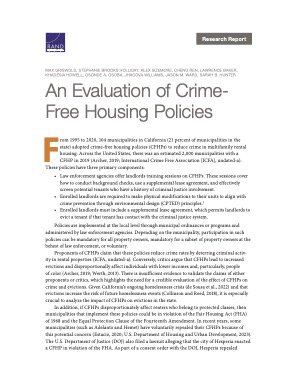An Evaluation of Crime-Free Housing Policies
By Max Griswold, Stephanie Brooks Holliday, Alex Sizemore, Cheng Ren, Lawrence Baker, Khadesia Howell, Osonde A. Osoba, Jhacova Williams, Jason M. Ward, Sarah B. Hunter
From 1995 to 2020, 104 municipalities in California adopted crime-free housing policies (CFHPs), seeking to reduce crime rates in multifamily rental housing. Across the United States, it is estimated that 2000 cities adopted a CFHP by 2019. Proponents of CFHPs claim these policies reduce crime by deterring criminal activity in rental properties. Critics argue that CFHPs lead to increased evictions and disproportionally impact low-income individuals, particularly people of color.
The authors evaluate proponents' and critics' claims regarding the effects of CFHPs, examine the implementation and enforcement of CFHPs, and assess how CFHPs affect the lived experiences of tenants in California. Findings indicate that CFHPs do not achieve their intended objective of preventing or reducing crime, but use of CFHPs does lead to a significant increase in evictions.
Key Findings
In 2020, there were 104 municipalities in California with a crime-free housing policy (CFHP). Between 2009 and 2019, 34 municipalities implemented CFHPs, which potentially increased policy coverage by 2.4 million renters.
The results of our study indicate no statistically meaningful relationship between CFHPs and crime rates but a strong relationship with increased evictions.
Municipalities with CFHPs have larger population proportions of Black residents than municipalities without CFHPs. Additionally, within municipalities, rental units covered by CFHPs are in neighborhood blocks with lower per capita income than municipal blocks without CFHP units.
It is difficult to challenge evictions caused by CFHPs because tenants often do not know the cause of their eviction and because CFHP evictions are treated by the court system as standard lease violations.
Tenants in CFHP properties are closely surveilled by both law enforcement, landlords, and property managers. Law enforcement agencies stay in contact with landlords and property managers who lease CFHP-covered units, and some agencies maintain databases that track tenant encounters with law enforcement officers.
Recommendations
Municipalities should reconsider maintaining or adopting CFHPs. Prior research and the findings in this report show that CFHPs do not serve their main purpose of reducing crime and do increase evictions.
State law should ensure that tenants are informed about evictions caused by CFHPs. Tenants are frequently unable to understand the cause of their eviction, and therefore face barriers to seeking legal assistance in eviction proceedings
Legislators should consider adopting civil right-to-counsel policies in eviction proceedings. In general, without legal representation, tenants are more likely to be evicted, face larger monetary judgments, and are more likely to be removed from their housing. Adopting these policies could result in more-equitable outcomes.
Santa Monica, CA: RAND, 2023, 24p.


